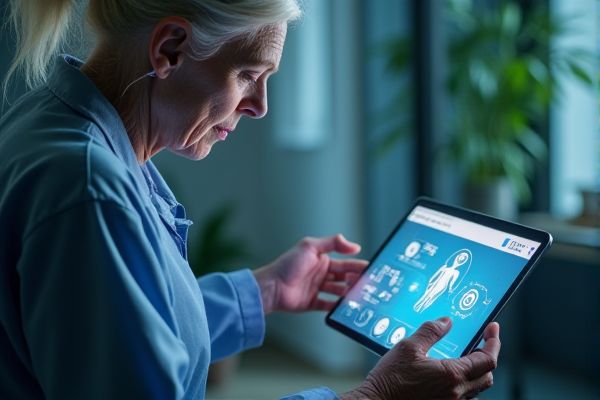
AI technologies enhance elder care by providing personalized support tailored to individual needs. Smart monitoring systems enable families and caregivers to track vital signs and detect anomalies, ensuring timely interventions. Virtual assistants facilitate medication reminders and help seniors manage daily tasks, promoting independence. Robotics and automation also assist with mobility and daily activities, improving the quality of life for older adults.
AI usage in elder care
Remote Health Monitoring
The implementation of AI in elder care can facilitate more effective remote health monitoring, allowing caregivers to track vital signs and health conditions from a distance. Tools such as wearable devices can provide real-time data, enhancing the accuracy of health assessments. These advancements may lead to improved response times in emergencies, ultimately benefiting institutions like nursing homes. The potential for reducing hospital visits also presents a significant advantage for families and elderly individuals alike.
Personalized Care Plans
AI can enhance elder care by creating personalized care plans tailored to individual needs and preferences. For instance, institutions like Brookdale Senior Living may implement AI algorithms to analyze health data and monitor changes in elderly residents' conditions. This technology holds the potential to improve health outcomes and streamline communication between caregivers and families. Personalized care plans can increase the quality of life for seniors by ensuring that their specific needs are met efficiently.
Fall Detection Systems
AI usage in elder care can enhance safety and provide timely assistance through the implementation of fall detection systems. These systems utilize sensors and machine learning algorithms to identify when an elderly person has fallen, ensuring quick response measures are taken. For instance, a system developed by companies like Philips can alert caregivers instantly, minimizing the risk of serious injuries. The adoption of such technologies increases the potential for independent living among seniors while offering peace of mind to their families.
Cognitive Health Assessment
AI can enhance elder care by providing tools for Cognitive Health Assessment, allowing for timely evaluation of cognitive decline. Technologies like machine learning algorithms can analyze data from assessments, improving accuracy in diagnosing conditions like dementia. There is a potential for AI to customize care plans based on individual needs, increasing the chances of better health outcomes. Institutions like nursing homes may benefit from implementing these AI systems to optimize their services.
Voice-Activated Assistants
Voice-activated assistants can greatly enhance communication and accessibility in elder care settings. For instance, caregivers at assisted living facilities may utilize these technologies to facilitate immediate assistance and reminders for medication. The potential for increased independence among elderly individuals is notable, as they can engage with technology for tasks like calling emergency services or controlling their environment. With proper integration, these tools may improve quality of life while reducing caregiver burden.
Medication Management
AI can enhance medication management in elder care by ensuring timely reminders for patients. For instance, systems like Medisafe can analyze medication schedules and notify users when it's time to take their pills. This capability not only improves adherence but also reduces the risk of medication errors. The integration of AI in such contexts may lead to better health outcomes and increased independence for elderly individuals.
Predictive Health Analytics
AI usage in elder care can enhance the quality of life for senior citizens through personalized health monitoring. Predictive health analytics can identify potential health issues before they escalate, allowing for timely intervention. For instance, a system like IBM Watson could analyze patient data to predict falls or other health-related risks. The adoption of such technologies offers the possibility of not only improving health outcomes but also reducing healthcare costs.
Social Interaction Enhancement
AI technology can significantly enhance social interaction for the elderly, creating opportunities for increased engagement. Tools like conversational robots can provide companionship, reducing feelings of loneliness among seniors. Such advancements may improve mental well-being, leading to a better overall quality of life. Institutions like nursing homes may adopt these AI solutions to foster a more interactive environment for residents.
Mobility and Accessibility Support
AI applications in elder care can enhance mobility and accessibility for seniors, leading to improved quality of life. For example, robotic assistants can help with daily tasks, reducing reliance on human caregivers. Smart home technologies can enable greater independence by adapting to the needs of elderly residents, such as optimizing lighting and maintaining safety. The potential for AI to address these challenges suggests significant opportunities for enhancing the overall elder care experience.
Nutritional Guidance and Monitoring
AI technology holds the potential to revolutionize elder care through nutritional guidance and monitoring. For instance, AI systems can analyze dietary patterns and provide personalized meal suggestions, enhancing the overall health of seniors. The chance of improving adherence to nutritional plans increases as these AI solutions track progress and offer reminders. Institutions focused on elder care, such as nursing homes or assisted living facilities, may experience noticeable advantages in resident wellness through the integration of AI dietary management tools.
 techknowy.com
techknowy.com